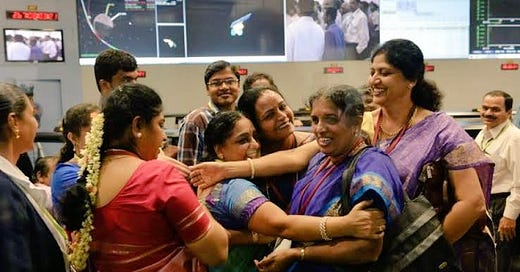Every year as March 8th rolls around, stores advertise sales, restaurants offer discounts, and we generally think appreciation of women is a new phenomenon. Modern Hindu kids are often so disconnected from their roots that they think Hinduism suppresses women, and only Western liberal values are pro-women.
It is up to parents to explain to kids how everything we read or watch online is dismissive of Hindus since our primary knowledge source is English.
While modern culture takes one day a year to think about women, Hindus start every day remembering the Feminine Divine with a morning prayer called karadarshana. While looking at the palm, one invokes the Divine through various deities, thus sanctifying all the actions that will be done during the day.
कराग्रे वसते लक्ष्मिः करमध्ये सरस्वति ।
करमूले स्थिते गौरी प्रभाते करदर्शनम् ॥
karāgre vasate lakṣmiḥ karamadhye sarasvati .
karamūle sthithe gauri prabhāte karadarśanam ..
At the fore of the hands resides Lakshmi, and at the middle, Saraswathi; at the root is seated Gauri, (so) see the palm at dawn (first).
Before getting out of the bed and placing their feet on the ground, Hindu children recite the Kshama Prarthana Shloka, asking Mother Earth for forgiveness for stepping on her and trampling her as we go about our chores. The first few seconds of waking up instill in children a beautiful morning thought of oneness with the environment and responsibility for the earth's fragile ecosystem.
समुद्रवसने देवि पर्वतस्तनमण्डले ।
विष्णुपत्नि नमस्तुभ्यं पादस्पर्शं क्षमस्वमे ॥
samudravasane devi parvatastanamaṇḍale .
viṣṇupatni namastubhyaṃ pādasparśaṃ kṣamasvame ..
O! Mother Earth, who has the ocean as her clothes, mountains and forests as her body, is the wife of Lord Vishnu. I bow to you. Please, forgive me as my feet are going to touch you.
The more these small prayers become a way of life in childhood, the less a child will be swayed by news articles that promote women’s empowerment as a modern ideal received entirely from non-Hindu cultures.
While the much-maligned Manusmriti is often quoted as proof of Hindu misogyny, do our children know that it also includes quotes like
यत्र नार्यस्तु पूज्यन्ते रमन्ते तत्र देवताः |
यत्रैतास्तु न पूज्यन्ते सर्वास्तत्राफलाः क्रियाः ||
Gods rejoice where women are honoured. All actions become fruitless where women are dishonoured - Manusmrti 3.56
Kids need access to balanced material as a counterpoint to mainstream news and media. If you are looking for books to stock at home or give out as presents, you can start with the ever-popular and easy-to-read Amar Chitra Katha comics. Here's a handy ACK set on Veeranganas - Five Valourous queens who fought Invaders. The book 'Saffron Swords' by Manoshi Sinha Rawal features many ordinary young women who displayed extraordinary courage and physical bravery to fight against invaders.
'The Mighty Ten: Ten Amazing Female Role Models from India' is a good start for the littlest Hindu children abroad.
Readers of all ages will love heroines from books like Abhaya by Saiswaroopa Iyer or the Shakti Series from the same publisher. 'Rsikas of the Rgveda' is an excellent introduction to the female rishis from the times of the Rig Veda.
For older children, you can try 'Feminine Journeys of the Mahabharata: Hindu Women in History, Text, and Practice' by Dr. Lavanya Vemsani.
Make time on Women's Day to watch 'Space MOMs,' an original and inspiring movie about women scientists in India's space research organization. Indian girls consistently choose careers in STEM fields; Indian women CEOs head companies; Indian sportswomen win medals in weightlifting and boxing. Instead of reporting these successes as a product of India's unique Hindu culture, purveyors and readers of news reports look down upon Hindu culture.
With knowledge of historical facts, current achievements, and scriptural reverence for the female principle, Hindu children need not look up to other cultures to teach them to revere and respect women. It is an integral part of Hindu culture, and as parents, we have to point them in this direction with the help of the many resources we have today.
It is not enough to give children an idea of Hindu culture without the tools to understand the world and live effectively as intelligent Hindus.
We need to teach kids that the modern world works by dividing us against one another to create competition and dissatisfaction in order to fuel consumption and activism.
Instead of falling for the divisive theme of women against men, we must teach our daughters and sons to work together in families as we have been doing for thousands of years. We see negative coverage of Karvachauth and Kanyadaan, but no positive articles about Hindu men praying to the Goddess and reciting the Lalitha Sahasranamam or Durga saptashati. Hinduism is far from being inherently misogynistic, as academicians and media claim.
Life is all about working as a team to strengthen one another, raising strong children in happy families while seeking redress for any wrongs within the framework of dharma. We must teach our children about dharmic frameworks and work out differences and grievances from within.
Regressive non-Hindu cultures in the Indian subcontinent often take advantage of the relative freedoms enjoyed by Hindu women to lure and force them into marriage with non-Hindu men for religious conversion, rearing multiple non-Hindu babies, and changing demography. These are issues that must not be sidestepped or avoided but spoken of freely, fearlessly, and boldly. Our children must be aware and raised capable enough to look out for other young Hindus and save their friends from these traps.
Empowerment is not about participating in meaningless protests to support the hijab; empowerment is not about discarding Hindu traditions while adopting untested western ones; empowerment is not about discarding the happiness from family to live depressingly solitary lives. True empowerment lies in accurate knowledge of Hinduism and history, being comfortable in one's identity as a Hindu, and being ready to safeguard dharma.
Truly empowering our children with clarity and focus is our duty towards the next generation of Hindus.




